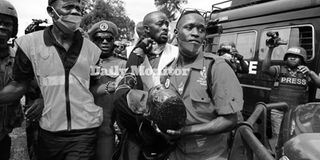Prime
EA Law Society threatens legal action over Uganda electoral violence

This photo taken on December 27, 2020 shows Mr Saif-llah Ashraf Kasirye, a Radio One journalist and an online Ghetto TV cameraman being helped after being injured as police dispersed Bobi Wine supporters in Masaka. PHOTO/ DAVID LUBOWA
What you need to know:
- On December 27, Francis Senteza, a private bodyguard to Kyagulanyi was allegedly knocked down and run over by a military vehicle but the army said without evidence that he fell off a moving car.
- On Wednesday, prominent human rights lawyer Nicholas Opiyo, who runs rights organisation Chapter Four Uganda and whose arrest and subsequent charges of money laundering created international calls for his release, was released on bail after nine days of detention.
The East Africa Law Society (EALS), a regional law forum, has condemned the human rights violations being committed against lawyers, journalists, political activists and the public in Uganda ahead of the country’s January 14 polls.
In a statement issued on Thursday and signed off by law society presidents from Uganda, Rwanda, Tanzania, Burundi, Zanzibar and Kenya, the EALS threatened court action should Ugandan officials including the president, Attorney General, military and police leadership fail to forestall further human rights violations and violence.
“Together with our national bar members and other partners across the region and globally, we are monitoring the situation in the Republic of Uganda and collecting crucial evidence that will enable us to institute actions against these acts that violate the EAC Treaty,” reads the statement.
Uganda is currently experiencing one of the most violent electoral seasons in decades characterised by mass arrests, deaths and disenfranchisement of opposition candidates.
In November, 54 people were killed by security forces after sporadic protests broke out in Kampala and other urban areas following the arrest of presidential candidate Robert Kyagulanyi alias Bobi Wine for flouting electoral guidelines instituted to curb the spread of the coronavirus when he held a public rally in Eastern Uganda. Opposition doubts this number and puts it at over 100.
Over 800 people have so far been arrested following the protests.
While on the campaign trail, opposition presidential candidates have often been blocked from gaining access to rally venues, radio and television stations. They have also had their supporters beaten, teargassed and some run over by security vehicles.
On December 27, Francis Senteza, a private bodyguard to Kyagulanyi was allegedly knocked down and run over by a military vehicle but the army said without evidence that he fell off a moving car.
During these campaigns, Kyagulanyi has had his car shot at twice, first in Jinja in November, breaking its windshield and missing the co-driver by a whisker and in Kyotera on December 27 as security forces tried to divert him to another route.
Forum for Democratic Change presidential candidate Patrick Amuriat Oboi was on Monday December 28 rushed to hospital after being pepper sprayed in Mbale by police as he tried to get to the city centre.
In the week leading to Christmas, the Electoral Commission suspended campaigns in 16 districts which it deemed to be at high risk of Covid-19 transmission but some opposition politicians have vowed to campaign there.
The government has also targeted civil society and journalists with several non-governmental organisations working in the governance and democracy sector having their bank accounts frozen and some of their foreign staff deported.
On Wednesday, prominent human rights lawyer Nicholas Opiyo, who runs rights organisation Chapter Four Uganda and whose arrest and subsequent charges of money laundering created international calls for his release, was released on bail after nine days of detention.
Ashiraf Kasirye a journalist with Ghetto TV and Radio One is still fighting for his life in hospital after police shot him on the head with a rubber bullet. Ali Mivule of NTV was injured on the thigh while Daniel Lutaaya is currently walking on crutches after being hit by a teargas canister while covering Kyagulanyi’s campaign.
On Thursday, Culton Scovia Nakamya of BBS TV and Derrick Wandera were arrested for recording the arrest of Kyagulanyi in Kalangala. Wandera’s mobile phone was smashed by police.
Several arrests of opposition coordinators and activists have been reported across the country with families and friends unable to trace them.
By Thursday, over 120 members of Kyagulanyi’s campaign team comprising technicians, sound engineers, security detail, photographers and medical personnel were still in custody after police and the military arrested them from the central Uganda archipelago of Kalangala.
The regional bar said that it had set up an ad hoc Rule of Law Committee comprising experienced lawyers from across the region for purposes of collecting and preserving relevant evidence and to “prepare watertight cases against the violators.”
The EALS said that the government should own up to the increasing reports on the deteriorating human rights, reduction of civic space and the rule of law which are its obligation under the constitution as well as under the Treaty Establishing the East African Community.
“We have witnessed far reaching human rights violations, wanton killings, partisan policing, freezing of accounts of several NGOs engaged in rule of law initiatives, incommunicado detention of human rights defenders and political opponents and trumped up criminal charges against advocates of rule of law,” EALS said.
The Electoral Commission spokesperson Paul Bukenya declined to comment on the issues before consulting the commission’s legal team. Efforts to get an official comment from government spokespersons were futile.



